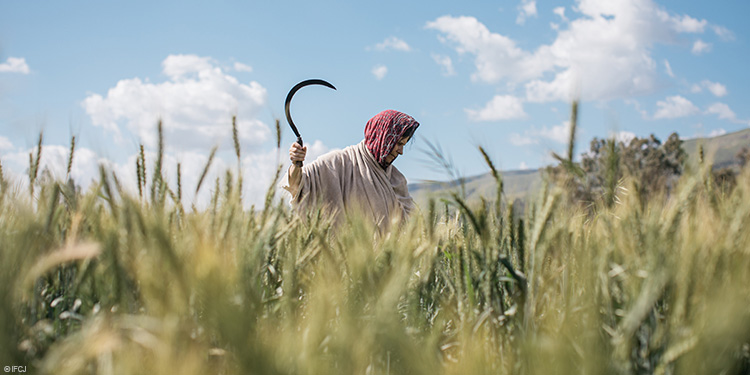Challah: The Blessing in the DoughSample


Bringing Blessings into the Home
The best of all the firstfruits and of all your special gifts will belong to the priests. You are to give them the first portion of your ground meal so that a blessing may rest on your household. — EZEKIEL 44:30
While the commandment of making challah is not gender specific, it has special significance among women. This is why when Abraham received the three angels disguised as men in Genesis 18, he personally saw to all their needs – water to wash up, meat for the meal, milk to drink – except for one item, the bread. Abraham asked Sarah to bake the bread for the men. This was not accidental. As the primary homemakers, women were especially suited for making challah, which brought blessings to the home.
Even after Sarah died and Abraham had continued to take the challah from the dough when he made the bread, it was not quite the same because the blessings were gone. According to Jewish tradition, several miracles existed in Abraham’s home while Sarah was living. Her challah stayed fresh from one Friday to the next, her Sabbath candles stayed lit from one Friday to the next, and a cloud of protection always rested above the tent. When Sarah passed away, the miracles also ceased to exist, until Isaac married Rebekah. When Rebekah baked the bread and took the challah, the blessings and the miracles returned to the home.
Whoever bakes the bread and performs the rituals associated with it, challah remains closely connected with the home. Home is where we make our food and nourish our families. It’s where we live, sleep, and take care of our physical needs. By giving us a commandment to perform while making bread, God is teaching us that His providence extends to our homes.
When a person goes out into the world to work, it is more obvious that he or she must depend on God for success. But God wants us to know that He is also intricately involved in what happens behind the closed doors of our homes. He is with us as we raise our children, go about our daily chores, and help others around us.
In fact, the very word challah reminds us of this fact. Challah is a composite of two other Hebrew words: chol, meaning “mundane,” and Yah, meaning “God.” By engaging in the ritual of making challah, we demonstrate that what seems most mundane — the baking of bread — is actually most holy. Whether we are washing dishes, doing the laundry, or simply sitting with family, we recognize God’s presence into our homes and experience His abundant blessings.
Scripture
About this Plan

Making challah, the braided Jewish bread associated with the Sabbath, is a wholly spiritual experience, and a labor of love, faith, and devotion. In this study, we'll learn about challah's biblical origins, find inspiration for today, and even share a recipe you can make at home!
More
We would like to thank International Fellowship of Christians and Jews for providing this plan. For more information, please visit: https://www.ifcj.org
Related Plans

Adversity

The Mandate to Multiply.

Your Prayer Has Been Heard: How God Meets Us in Seasons of Weariness and Waiting

Coffee Talks With Worship Leaders

Hope in Creator’s Promises

Scriptures and Hymns to Grow Your Joy This Christmas

What the Bible Says About Advent - 29 Days of Advent Meditations

Worth the Wait: Living Pure in a Culture of Pressure

The Promise of Revival
